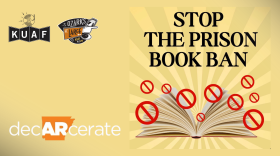AILSA CHANG, HOST:
In 1969, if you called up the Dial-A-Poem phone number, you might hear something like this.
(SOUNDBITE OF ARCHIVED RECORDING)
UNIDENTIFIED PERSON #1: Dial-A-Poem - William Burroughs.
UNIDENTIFIED PERSON #2: This reading is from an unpublished book entitled "Ah Pook Is Here."
CHANG: Poet and performance artist John Giorno launched Dial-A-Poem with a simple goal - to deliver random poems over the phone. He complained that poetry had fallen behind other artistic disciplines, relegated only to books and magazines. Giorno wanted to transform poetry into an interactive multimedia experience.
ANTHONY HUBERMAN: And so he recorded poets and artists and musicians whose work he admired, and then he put those recordings on a series of answering machines, set up a telephone number.
MARY LOUISE KELLY, HOST:
That is Anthony Huberman. He is executive artistic director of Giorno Poetry Systems, a nonprofit that Giorno founded. Now, Giorno himself died in 2019, but the group continues to support his work. And it has now launched Dial-A-Poem onto a new medium - the internet.
CHANG: (Laughter) That's right. The new online installation works much like the original. Click on an image of a phone on the website and listen.
(SOUNDBITE OF ARCHIVED RECORDING)
UNIDENTIFIED PERSON #3: Dial-A-Poem - Diane Wakoski.
UNIDENTIFIED PERSON #4: (Reading) Everything boils down to diamonds. You put all of your garbage, your scrap metal, your old papers, your worn-out shoes, your leftovers, et cetera, in a big pot, and boil them down until they turn into diamonds.
KELLY: The original collection, back in 1969, included recordings of poets such as Allen Ginsberg, Frank O'Hara and Giorno himself. But Giorno began to add more voices, and as the number of voices in the collection began to grow, so did the project's notoriety. In 1970, New York's Museum of Modern Art featured Dial-A-Poem in an exhibition, and the project then fell under scrutiny by the FBI and the FCC, which investigated indecency complaints and claims that certain political poems could incite violence.
CHANG: Dial-A-Poem also featured recordings, not traditionally thought of as poetry, like avant-garde musical compositions, speeches by members of the Black Panther Party and spiritual mantras.
(SOUNDBITE OF ARCHIVED RECORDING)
UNIDENTIFIED PERSON #5: (Chanting in non-English language).
HUBERMAN: It does one of the things that I think art can really do best. It can really add a sense of delight and discovery and surprise into the everyday.
KELLY: In recent years, Dial-A-Poem has added phone lines around the world. And among its hundreds of recordings are a new generation of poets and artists, sometimes reading in their native languages.
(SOUNDBITE OF ARCHIVED RECORDING)
UNIDENTIFIED PERSON #6: (Speaking Spanish).
KELLY: Huberman says moving the collection online is just the next step of realizing Giorno's original vision.
HUBERMAN: John Giorno was someone who was constantly trying to democratize poetry, constantly trying to bring it to a wider audience and constantly inventing new ways to do it.
CHANG: And hey, you can try it out for yourself at the new Dial-A-Poem website. Or if you prefer, you can still pick up that phone and dial 917-994-8949. Transcript provided by NPR, Copyright NPR.
NPR transcripts are created on a rush deadline by an NPR contractor. This text may not be in its final form and may be updated or revised in the future. Accuracy and availability may vary. The authoritative record of NPR’s programming is the audio record.






